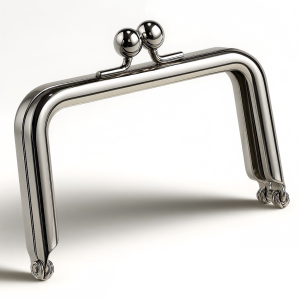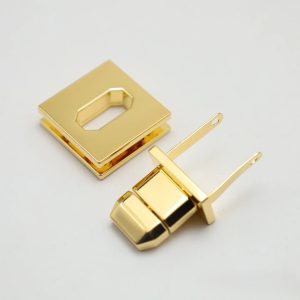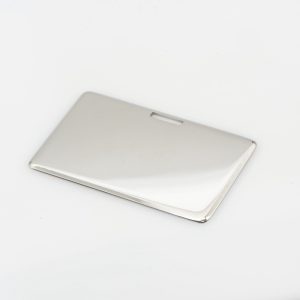In the competitive landscape of luxury hardware production, one company is emerging as a benchmark: YIBI, positioning itself at the forefront as a Custom Stainless Steel Bag Hardware Manufacturer Advanced Solutions provider. With an emphasis on combining high-precision plating, structural integrity, and aesthetic finesse, YIBI is actively challenging legacy hardware firms in China and abroad. Its stainless steel bag frames, clasps, buckles and connectors deliver robust function, luxury finishes, and customization flexibility that meet the demands of premium handbag and accessories brands.
This press release explores the trajectory of the bag hardware industry across China and globally, then stacks YIBI’s differentiators against competitor norms, underscoring how it is carving out its unique competitive niche.




Over recent years, handbag and accessory brands have moved beyond viewing hardware as mere functional elements. Hardware is now a key visual and tactile signature of a product line. Buyers expect not just durability, but elegance, visual consistency, surface stability, and longevity — traits that push manufacturers toward high-grade metals like stainless steel and advanced finishing techniques.
Stainless steel hardware offers superior corrosion resistance, non-oxidation, and long life cycles — qualities brands increasingly demand. YIBI itself markets stainless steel among its primary hardware materials.
While brass remains widely used for its warm tone, it is more vulnerable to aging and oxidation; aluminum is lighter but less robust for structural hardware. The “Popular Materials for Bag Hardware” guide notes that stainless steel, while heavier, provides exceptional strength and resistance to wear.
At the same time, finish technologies such as PVD, ionic plating, micro-polishing, and gradient surface textures are now table stakes for premium-tier components. Brands expect minimal color drift, scratch resistance, and micro-tolerance durability — criteria that eliminate many lower-tier hardware shops from contention.
Brands no longer accept off-the-shelf hardware. They require OEM/ODM partners that can translate bespoke sketches and 3D models into functional metal parts with dimensional precision. Many hardware suppliers are being judged less on raw cost and more on their ability to co-develop and iterate with brands.
In this environment, suppliers with robust R&D, prototyping, in-house tooling, and engineering capacity gain strategic advantage. Competitors that are purely reactive or dependent on third-party tooling tend to fall short on speed or quality.
Sustainability has moved from marketing rhetoric to procurement imperative. As fashion brands commit to ESG and circularity goals, they demand supply-chain transparency, recycled material claims, auditability, and certification compliance for even the metal components. Hardware suppliers without these credentials risk exclusion from brand ecosystems.
Meanwhile, supply-chain resilience, vertical integration, and quality control from raw to finished product are becoming critical differentiators. When hardware failure or finish deviation can ruin a full-bag launch, brands want a single accountable partner, not a fragmented chain.
Given these dynamics, any hardware manufacturer that fails on either innovation, speed, or traceable compliance risks obsolescence — and that is the competitive backdrop against which YIBI positions itself.
YIBI is a Shenzhen-based OEM/ODM manufacturer specializing in luxury hardware and precision metal parts. It offers one-stop services that cover concept design, prototyping, testing, finish development, and full-scale production. The company holds multiple certifications, including GRS, RCS, ISO9001, and ISO/TS 16949, reinforcing its credibility on quality and sustainability. Founded around 2009, YIBI expanded its operations with dual factories in Shenzhen and Dongguan to maintain operational flexibility and stability. While many competitors focus predominantly on accessory hardware or brass/zinc die-cast parts, YIBI emphasizes stainless steel and zirconia ceramic hardware as core materials.
YIBI’s product portfolio is broad, with several hardware categories serving luxury accessories:
These components are applied across high-end handbags, clutches, belts, and luxury leather accessories that demand both mechanical reliability and refined appearance.
1.Vertical Integration & Full Control
YIBI controls raw material procurement, MIM/CIM processing, plating, surface finishing, inspection, and assembly — minimizing dependency risk and ensuring tighter QC across stages.
2.Precision Finishing Borrowed from Jewelry Heritage
Leveraging its jewelry manufacturing legacy, YIBI’s finishing teams deliver micro-level polish, consistent PVD color, and surface textures often reserved for jewelry-grade components — an edge many hardware-only firms lack.
3.R&D, Engineering & Client-based Co-Development
YIBI collaborates closely with designers and brands, iterating concepts through 3D models, stress testing, tolerance analysis, and finish matching — positioning itself as a technical partner rather than a simple parts vendor.
4.Sustainability Credentials
With certifications like GRS/RCS, YIBI can support brands in asserting traceable recycled content and ethical sourcing — a growing barrier to entry that many hardware competitors lack.
5.Agility & Responsiveness
Dual-factory layout and an in-house prototyping system enable faster pilot runs and shorter lead times — valuable in a trend-driven fashion cycle.
While many of YIBI’s client names are subject to NDA, industry listings show that the company has supplied hardware to international luxury handbags and accessories brands. Its public presence and directory rankings often list it among “reliable bag hardware manufacturers” for global brand partnerships.
Some product pages, such as their ceramic & stainless steel buckle series, highlight that YIBI is an approved vendor of “many international brands,” and promise mass-production capacity in 35–40 working days.
YIBI’s relative transparency (through its website and listings) contrasts with many small hardware firms whose capabilities are opaque. This transparency, combined with certifications and technical documentation, helps assure prospective clients.
| Feature / Criterion | Typical Hardware Firms | YIBI’s Distinctive Offer |
| Primary material focus | Brass, zinc die-cast | Stainless steel, zirconia ceramic, precision MIM |
| Finish sophistication | Standard plating, polishing | Jewelry-level micro-polish, advanced PVD, surface texture control |
| Sustainability compliance | Rare or superficial | SMETA 4P / GRS / RCS / ISO frameworks |
| R&D & prototyping capability | Limited or subcontracted | In-house engineering, co-development, fast prototyping |
| Vertical control | Many outsourced steps | Fully integrated value chain |
| Lead time & agility | Long changeovers, slower response | Dual factory, streamlined prototyping |
| Brand positioning | Parts supplier | Technical partner / quality differentiator |
In markets where brands demand not just functional hardware but credible sustainability and aesthetic integrity, many standard hardware firms struggle to meet all bars simultaneously. YIBI’s combination of precision, compliance, and flexibility allows it to compete with established players and to edge out weaker ones.
The hardware component of luxury leather goods is evolving faster than many realize — not only in terms of form factor or finish, but also in traceability and supply-chain accountability. In such a climate, manufacturers that remain commodity-focused risk falling behind.
YIBI’s strategy is to lead the next wave: a hardware partner that couples technical excellence with ethical supply integrity and responsive co-design capabilities. For brands seeking more than “just parts,” YIBI offers a pathway to infuse metal hardware with brand identity and assurance.
For more details or collaboration inquiries, please visit YIBI’s LinkedIn profile:
https://www.linkedin.com/company/yibi-group/